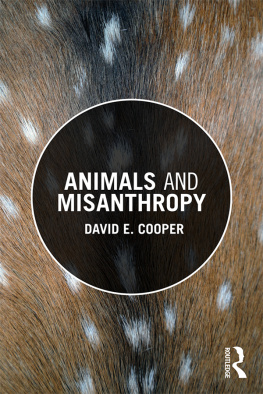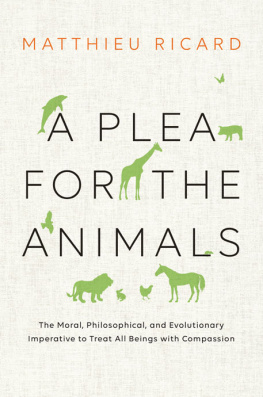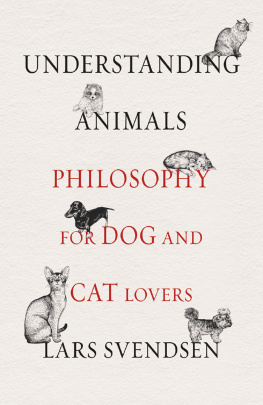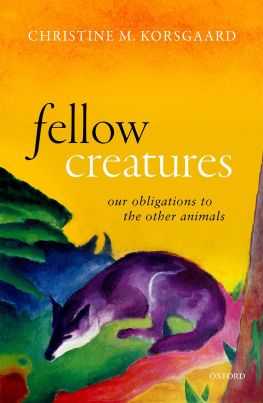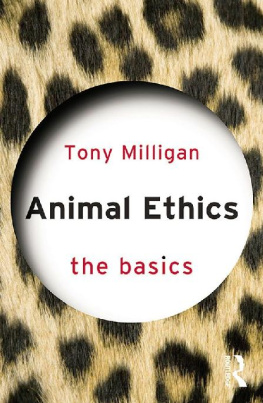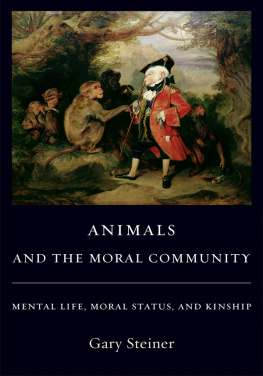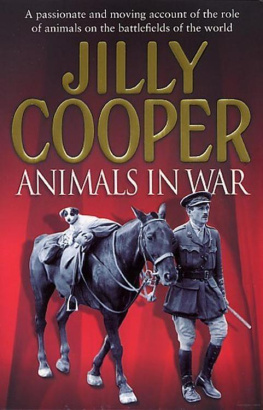Animals and Misanthropy
This engaging volume explores and defends the claim that misanthropy is a justified attitude towards humankind in the light of how human beings both compare with and treat animals. Reflection on differences between humans and animals helps to confirm the misanthropic verdict, while reflection on the moral and other failings manifest in our treatment of animals illuminates what is wrong with this treatment. Human failings, it is argued, are too entrenched to permit optimism about the future of animals, but ways are proposed in which individual people may accommodate to the truth of misanthropy through cultivating mindful, humble and compassionate relationships to animals. Drawing on both Eastern and Western philosophical traditions David E. Cooper offers an original and challenging approach to the complex field of animal ethics.
David E. Cooper is Emeritus Professor of Philosophy at Durham University, UK. He has been a Visiting Professor at universities in several countries, including the USA and Sri Lanka. His many books include The Measure of Things: Humanism, Humility and Mystery, A Philosophy of Gardens, Convergence with Nature: A Daoist Perspective and Senses of Mystery: Engaging with Nature and the Meaning of Life.
PRAISE FOR THIS BOOK
David E. Coopers Animals and Misanthropy is a meditation on animals and humans. It is also an argument for a negative view of humankind. Humanitys vices, Professor Cooper argues, are in full display in its treatment of animals beings that are themselves innocent. He writes with sensitivity about animals and without rancour about humans, thus defending a gentle but uncompromising misanthropy. You do not have to be respectful of animals or misanthropic to start reading this book, but dont be surprised if you are both after you have finished it.
David Benatar, University of Cape Town, South Africa
In this short, powerful book, David E. Cooper argues that honest reflection on the awful situation of animals justifies a charge of misanthropy a negative moral judgment on human life at large. Surveying practices and institutions such as animal agriculture, we find a variety of human vices and failings cruelty, insensitivity, hubris so entrenched and extensive that they warrant critical judgment on nothing less than our way of life itself. By contrast, lucid appreciation of the lives of animals shows them to be characterised by spontaneity and other virtues, alongside a fundamental vulnerability ruthlessly exploited by human beings. By drawing upon the writings of Western and Asian philosophers and others engaged personally and professionally with animals, Cooper advances a charge of misanthropy that corrects vainglorious moral optimism and points to other, better ways to live with animals.
Ian James Kidd, University of Nottingham, UK
In this lucid and elegant book Cooper draws effortlessly on literature and world philosophy to gather evidence for a bleakly compelling verdict on the morally barbarous condition of humanity through a consideration of how we compare with and treat animals, particularly those at our mercy, refreshing the meaning of misanthropy.
Michael McGhee, University of Liverpool, UK
Animals and Misanthropy explores our dark side as human beings by contrasting it with the innocence of the animals we so often mistreat. It is an important and strikingly original contribution to the field of animal ethics, and essential reading, surely, for anyone concerned with our moral relations to the more-than-human world.
Simon P. James, Durham University, UK
David E.
Cooper
Animals and Misanthropy

First published 2018
by Routledge
2 Park Square, Milton Park, Abingdon, Oxon OX14 4RN
and by Routledge
711 Third Avenue, New York, NY 10017
Routledge is an imprint of the Taylor & Francis Group, an informa business
2018 David E. Cooper
The right of David E. Cooper to be identified as author of this work has been asserted by him in accordance with sections 77 and 78 of the Copyright, Designs and Patents Act 1988.
All rights reserved. No part of this book may be reprinted or reproduced or utilised in any form or by any electronic, mechanical, or other means, now known or hereafter invented, including photocopying and recording, or in any information storage or retrieval system, without permission in writing from the publishers.
Trademark notice: Product or corporate names may be trademarks or registered trademarks, and are used only for identification and explanation without intent to infringe.
British Library Cataloguing-in-Publication Data
A catalogue record for this book is available from the British Library
Library of Congress Cataloging-in-Publication Data
A catalog record for this title has been requested
ISBN: 978-1-138-29593-3 (hbk)
ISBN: 978-1-138-29594-0 (pbk)
ISBN: 978-1-315-09966-8 (ebk)
Typeset in Joanna MT
by Apex CoVantage, LLC
Contents
I am grateful to Simon P. James and Ian James Kidd for their encouraging and useful comments on draft chapters of this book. My thanks go as well to the editorial team at Routledge Gabrielle Coakeley, Rebecca Shillabeer and Ruth Berry and to the project manager, Autumn Spalding. It has been a pleasure working with them.
Some months ago I was walking in the Cheviot hills of Northumberland, enjoying the heather, the gorse, the tumbling streams, and also the singing of birds, the scurrying of rabbits and the glimpse of a fox returning to its den. Even before I turned the bend on the track I was following, I knew my enjoyment was over, for I could hear ahead of me the merry shouting of a party of shooters as they were disgorged from their range rovers. I walked past these men while they collected their guns and game bags from the back of their vehicles.
I disliked these men, for what they were about to do to the pheasants or grouse that would soon be driven towards their guns, but also for how, to me, they looked, sounded and smelt intoxicated, mindless, vulgar, swaggering and harsh.
My likes and dislikes, of course, are neither here nor there. More interesting, though, is a set of reflections that an encounter like mine in the Cheviots can inspire reflections that could equally be prompted by, say, footage of an abattoir worker laughing as he clubs a pig to death, or of a laboratory assistant immune to the screams of the dogs to whom she periodically administers electric shocks.
The reflections my encounter prompted were on how relationships between human beings and animals should inform an assessment, an appraisal, of the human condition. By relationships, here, I dont simply mean human attitudes towards and treatment of animals, but also our kinship (or lack of it) to animals, our similarities and dissimilarities to them. Someone who reflects on these matters may come to agree with Friedrich Nietzsches remark that not only does man represent no progress over the animal but that he has become decadent.
To sympathise with such judgements is to be on the way, at least, to adopting a misanthropic attitude towards humankind. Reflections on our relationships to animals have the power, it seems, to reinforce or even inspire a dark vision and hostile appraisal of our species. There is really no need here for the words it seems, since it is clear that the negative assessments of the human condition made by many thinkers have indeed been strengthened by their perceptions of how people compare with or treat animals. Among these thinkers are Zhuangzi and Plutarch in the ancient world and, more recently, Michel de Montaigne, Jean-Jacques Rousseau, Arthur Schopenhauer and Walt Whitman. A contemporary instance is a 2008 book by a philosopher that describes his life with a pet wolf, Brenin. The author, Mark Rowlands, calls himself a natural misanthrope, someone who needs to tune out human beings. This need is due, not simply to recognising the human evil manifested in peoples treatment of animals, but to appreciation as well of the freedom of wolves and other animals from the vices and failings that contaminate human life cruelty, deception, ingratitude and the rest.

